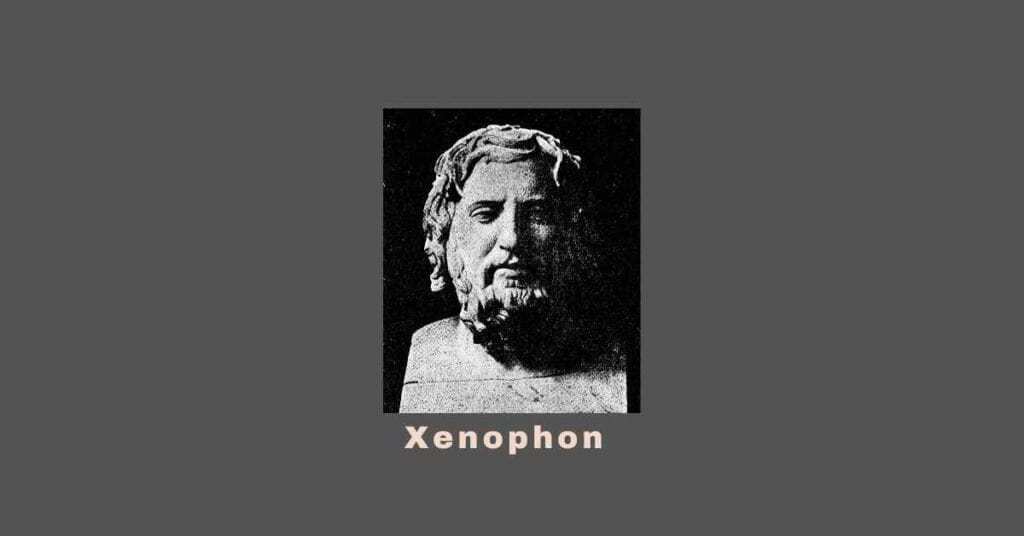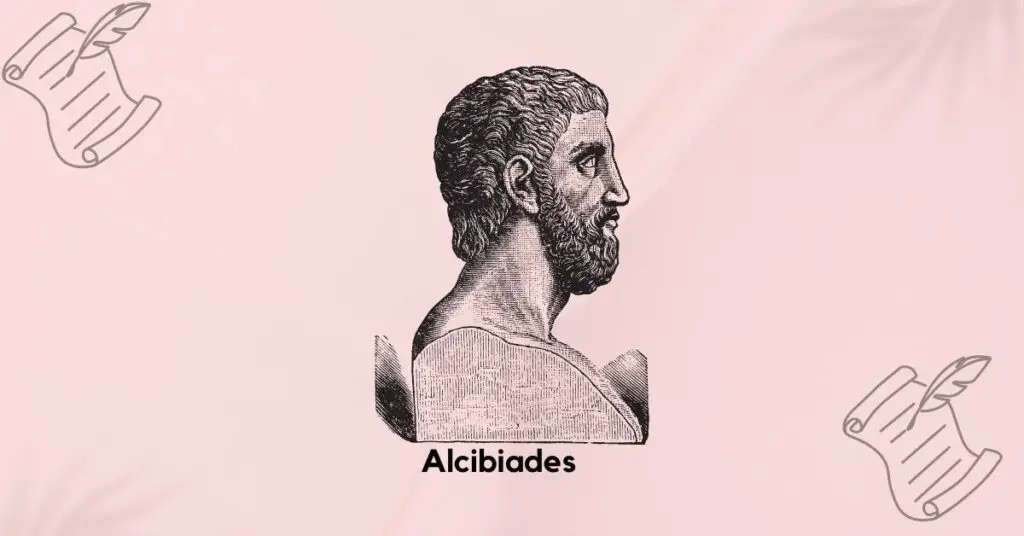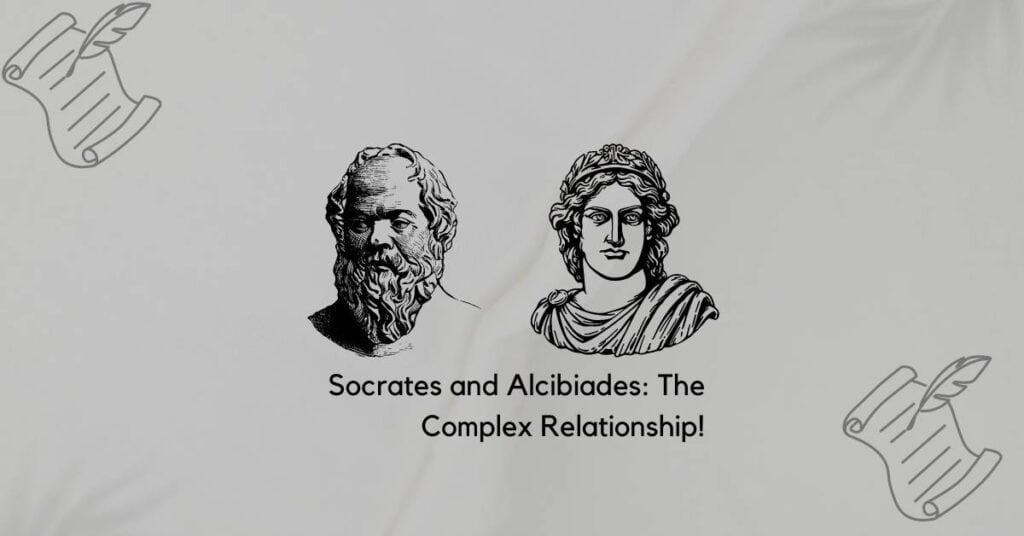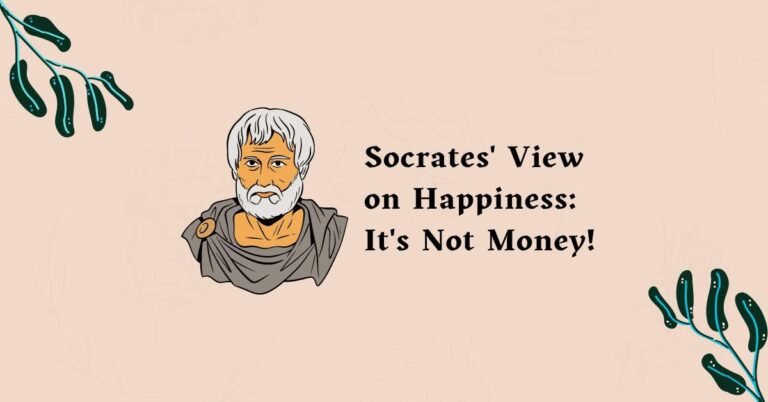Socrates and Alcibiades: The Complex Relationship!
Despite their differing roles in Athenian society, Socrates and Alcibiades shared a complex relationship. It was marked by mentorship, friendship, and philosophical dialogue.
Socrates, a towering figure in ancient Greek philosophy, is renowned for his Socratic method of questioning. He was born into a poor family and was known for his wisdom, humility, and commitment to truth. Moreover, he fearlessly pursued philosophical inquiry despite facing opposition and persecution. Socrates lived a simple life all through his life.
Alcibiades, on the other hand, was a prominent Athenian statesman. He was a general known for his charisma, intelligence, and political ambition. He possessed a magnetic personality and natural leadership qualities.
Importance of Socrates and Alcibiades relationship in ancient Greek history:
The connection between Socrates and Alcibiades is very important in old Greek history. It shows what life was like in Athens during the 5th century BCE. It was a time when people thought a lot about big questions, and there was a lot of drama in politics.
Their friendship shows how philosophy and politics were linked back then. They also teach us how important it was to have someone to look up to and learn from in ancient Greece. Their story helps us understand how philosophy, politics, and friendships were all connected back then.
Plato on Socrates and Alcibiades:
Plato, a student of Socrates and a renowned philosopher in his own right wrote about the relationship between Socrates and Alcibiades in several of his dialogues, most notably in “Symposium” and “Alcibiades I.”
In “Symposium,” Plato portrays Alcibiades delivering a speech praising Socrates’ character and intellect, describing his admiration and love for his teacher.
Alcibiades’ speech reveals the depth of his affection for Socrates and highlights the profound impact Socrates had on his life.
In “Alcibiades I,” Plato presents a dialogue between Socrates and Alcibiades, where Socrates questions Alcibiades about his understanding of virtue and wisdom. Through their conversation, Plato explores the complexities of Alcibiades’ character and his relationship with Socrates, shedding light on the dynamics of their mentorship and friendship.
Plato’s writings offer valuable insights into the relationship between Socrates and Alcibiades, providing a window into their philosophical dialogues and personal interactions.
Through his dialogues, Plato captures the essence of their bond and the enduring legacy of their intellectual and emotional connection.
Xenophon on Socrates and Alcibiades:

Xenophon, another ancient Greek philosopher and historian, also wrote about Socrates and Alcibiades in his works, particularly in his “Memorabilia” and “Hellenica.”
In “Memorabilia,” Xenophon portrays Socrates as a wise teacher and mentor, often engaging in philosophical discussions with Alcibiades and other prominent figures of Athenian society. Xenophon highlights Socrates’ moral teachings and his influence on the ethical development of Alcibiades and other young men.
In “Hellenica,” Xenophon provides a historical account of ancient Greek history, including events involving Socrates and Alcibiades. He describes Alcibiades’ political career and his interactions with Socrates, offering insights into their relationship within the broader context of Athenian politics and society.
Through his writings, Xenophon offers a unique perspective on the relationship between Socrates and Alcibiades. It provided historical and philosophical insights into their interactions and the impact of their teachings on ancient Greek society.
Early Encounters: The Mentorship Begins:
-
Socrates’ philosophical teachings and influence:
Socrates often spoke with his students and his fellow citizens and helped them think things through for themselves. He was a good man. And he was big on thinking about what’s right and being a good person.
He had this saying, “Know yourself,” which meant it’s important to understand who you are. He also had some ideas about how leaders should be good and honest.
His way of thinking didn’t just stay in philosophy. It also made people think about politics and how to be a better person. So, Socrates’ ideas were like a big deal and still influence us today.
-
Alcibiades’ introduction to Socrates:
Alcibiades, a rising star in ancient Athens’ political scene, first met Socrates at a gathering of intellectuals. Alcibiades was a young man, likely in his late teens or early twenties, when he first met Socrates. Alcibiades approached Socrates, intrigued by the philosopher’s reputation. Their first conversation unfolded amidst the bustling atmosphere of the gathering.
Socrates posed thought-provoking questions, engaging Alcibiades in a lively exchange. This initial encounter left a profound impression on Alcibiades. It sparked a newfound curiosity for Socrates’ philosophical teachings. It prompted Alcibiades to delve deeper into the world of intellectual discourse.
Thus began a dynamic relationship between mentor and protege. It set the stage for future interactions that would shape Alcibiades’ philosophical outlook and influence his trajectory in the political arena.
-
Initial impressions and impact on Alcibiades’ worldview:
When Alcibiades first met Socrates, he was struck by the philosopher’s calm demeanor and insightful questions. Socrates’ way of thinking was unlike anything Alcibiades had encountered before.
It made him realize that there was more to life than just politics and power. Socrates’ emphasis on self-awareness and critical thinking challenged Alcibiades to look at the world in a different light.
This initial encounter with Socrates planted the seeds of introspection and intellectual curiosity in Alcibiades’ mind, shaping his worldview and influencing his future decisions.
Socrates’ mentoring style and teachings:
Socrates was known for his unique mentoring style. Instead of lecturing or preaching, he engaged his students in dialogue, encouraging them to think critically and arrive at their conclusions.
Through this Socratic method, he challenged their beliefs and assumptions, guiding them toward deeper insights and self-discovery.
Socrates played a vital role in converting Athenian people into wise men through his teachings. He tried to influence the young men of Athens positively by questioning their common beliefs. This often affected him negatively. At one point, Athenian Politicians and the Jury convicted him guilty of corrupting the youth and put him on trial.
But, Socrates always stayed with his morals and the truth. He was not afraid of any threats, even not his death. His teachings revolved around the pursuit of wisdom and virtue. He believed that proper knowledge came from questioning and examining one’s own beliefs.
Socrates often emphasized the importance of moral integrity and self-knowledge. He urged his students to strive for excellence in both thought and action. Overall, Socrates’ mentoring style and teachings were characterized by their emphasis on critical inquiry, moral reflection, and the pursuit of truth.
His influence continues to resonate through the centuries. It inspires generations of thinkers and scholars to engage in the pursuit of knowledge and self-understanding.
Alcibiades’ admiration and emulation of Socrates:

Alcibiades was deeply impressed by Socrates’ intellect and wisdom. He admired Socrates’ ability to question everything and think deeply about life’s big questions. Inspired by Socrates’ approach to philosophy, Alcibiades sought to emulate his mentor’s way of thinking and living.
He admired Socrates’ commitment to truth and virtue, seeing him as a role model for ethical conduct and intellectual honesty.
He respected Socrates’ integrity and humility, qualities that he aspired to embody in his own life. Alcibiades’ emulation of Socrates was evident in his efforts to engage in thoughtful dialogue and self-examination, following in the footsteps of his mentor’s philosophical legacy.
Examples of their philosophical dialogues and debates:
Socrates and Alcibiades engaged in numerous philosophical dialogues and debates, exploring a wide range of topics from ethics to politics.
One notable example of their discussions revolves around the concept of justice.
In these dialogues, Socrates would pose thought-provoking questions to Alcibiades, challenging him to examine his understanding of justice and morality.
Through these exchanges, they would explore different perspectives and consider the implications of their beliefs on individual and societal behavior.
Another example is their discussions on the nature of leadership and governance.
Socrates, drawing upon his experiences and philosophical insights, would engage Alcibiades in debates about the qualities of a good leader and the responsibilities of those in positions of power.
These dialogues would often delve into questions of virtue, wisdom, and the common good. It offered valuable insights into the complexities of leadership in ancient Athens.
Furthermore, Socrates and Alcibiades would debate the role of education in shaping character and fostering intellectual growth.
They would discuss the importance of cultivating virtues such as courage, temperance, and justice. Moreover, they explore the methods by which individuals could strive for moral excellence.
Overall, their philosophical dialogues and debates provided a platform for intellectual exchange and personal growth. It allowed both Socrates and Alcibiades to deepen their understanding of philosophical concepts and refine their own beliefs.
Challenges and Conflicts between Alcibiades and Socrates:
-
Alcibiades’ ambitions and political aspirations:
Alcibiades, a prominent figure in Athenian society, harbored ambitious political aspirations from a young age. His desire for power and influence drove him to actively pursue opportunities for advancement within the political landscape of ancient Athens.
Examples:
– Alcibiades’ early involvement in Athenian politics, seeking to align himself with influential figures and factions.
– His pursuit of military glory and political power, evidenced by his active participation in Athenian military campaigns and diplomatic missions.
– Alcibiades’ strategic alliances and manipulative tactics aimed at furthering his political agenda and consolidating his position of authority.
He was a man of beauty and wisdom. However, these ambitions propelled Alcibiades to the forefront of Athenian politics. There, he sought to leave a lasting mark on the city-state’s governance and affairs.
However, his relentless pursuit of power would eventually lead to both triumphs and setbacks. It shaped his tumultuous political career and left a complex legacy in ancient Greek history.
-
Disagreement between Socrates and Alcibiades:
There were times when Socrates and Alcibiades didn’t see eye-to-eye, leading to arguments and tension in their relationship.
Examples:
Alcibiades wanted power and success in politics, but Socrates cared more about being honest and doing what was right.
They argued about how leaders should behave and what’s essential in life. Alcibiades thought winning was everything, while Socrates believed in fairness and goodness.
They also disagreed on big ideas like justice and virtue, causing them to clash over what’s right and wrong.
Sometimes, they even competed against each other because they had different goals and ways of doing things.
These disagreements showed that even though they were friends, Socrates and Alcibiades had their differences. They had to figure out how to work through their problems while still respecting each other’s viewpoints.
Friendship and Fracture:
-
Evolution of their relationship beyond mentorship:
As time passed, the relationship between Socrates and Alcibiades grew into something more than just a mentor and student bond. They started to see each other as friends, not just teachers and pupils.
Alcibiades began to rely on Socrates not only for guidance in philosophy but also for advice in other areas of life. Socrates, in turn, showed a genuine interest in Alcibiades’ well-being, offering support and encouragement beyond philosophical matters.
There is historical speculation and debate regarding the nature of the relationship between Socrates and Alcibiades. Some scholars even suggest that there may have been a romantic or erotic dimension to their connection. While there is no conclusive evidence to confirm this, certain aspects of their relationship have led to speculation.
For instance, in Plato’s Symposium, Alcibiades delivers a speech praising Socrates’ character and physical appearance, likening him to the mythical figure Silenus. Alcibiades’ admiration for Socrates is portrayed in a highly affectionate and intimate manner. It led some interpreters to infer romantic undertones.
Furthermore, the ancient Greeks had a cultural acceptance of homoerotic relationships, particularly between older mentors (erastai) and younger mentees (eromenoi). It adds complexity to the analysis of their relationship.
However, it’s essential to approach this topic with caution, as cultural biases and the limited historical evidence available may influence interpretations. Ultimately, the true nature of the relationship between Socrates and Alcibiades remains a subject of speculation and interpretation.
-
Factors that strengthen Socrates and Alcibiades bond:
As Socrates and Alcibiades became closer, a few things helped their friendship grow strong:
Shared Interests: They both loved learning and thinking deeply. This made their talks meaningful and helped them understand each other better.
Personal Connection: Over time, they became more than just teachers and students. They truly cared about each other and respected their differences.
Emotional Support: Socrates was there for Alcibiades during tough times, offering advice and comfort beyond just talking about philosophy.
Recognition and Encouragement: Socrates saw Alcibiades’ ambition and cheered him on. Even though they didn’t always agree, Socrates respected Alcibiades’ drive and bravery.
Shared Experiences: They went through a lot together, facing challenges and celebrating victories. These shared moments strengthened their bond and made them feel like family.
Together, these factors turned their mentorship into a genuine friendship filled with trust, respect, and admiration. Socrates and Alcibiades showed how friendship can overcome differences and leave a lasting impact on history.
-
Ending of Socrates and Alcibiades Friendship:
The friendship between Socrates and Alcibiades hit some rough patches that caused their bond to break:
Different Philosophies: Socrates believed in truth and morals, but Alcibiades cared more about politics and power. Their ideas clashed, causing tension.
Conflicting Goals: Alcibiades’ political ambitions didn’t always match Socrates’ ethical principles. This created problems when Alcibiades did things that went against what Socrates taught.
Competition and Rivalry: They competed for attention and influence in Athens, leading to feelings of jealousy and mistrust between them.
Accusations and Suspicion: People accused Socrates and Alcibiades of wrongdoing, making things even more strained between them.
Drifting Apart: Eventually, their differences became too much to handle, and they drifted apart. Their friendship ended, but the lessons they taught us about friendship, integrity, and truth still live on.
Legacy and Influence of Socrates and Alcibiades:
Socrates and Alcibiades left a significant mark on history, especially in philosophy, politics, and ethics:
Philosophical Impact: Socrates’ way of thinking laid the foundation for a lot of what we believe today. He taught us to think critically and be wise, which still inspires people all over the world.
Political Influence: Alcibiades’ actions in Athenian politics showed us how leadership and power can be complicated. His strategies and decisions give us insight into the challenges of governing and diplomacy.
Ethical Lessons: The friendship between Socrates and Alcibiades reminds us how important it is to be honest and fair in our relationships and leadership. Their dialogues about justice and goodness make us think about what’s right and wrong.
Cultural Legacy: Their stories and teachings are not just for philosophers; they’re part of our culture. We see their influence in art, books, and even movies, where they’re symbols of intelligence and goodness.
Peloponnesian War: Alcibiades played a significant role in the Peloponnesian War. It was a protracted conflict between Athens and Sparta, along with their respective allies, from 431 to 404 BCE.
He was a prominent Athenian statesman, general, and politician who had a significant impact on the course of the war.
Alcibiades initially supported aggressive Athenian policies and played a role in persuading Athens to embark on military campaigns, including the ill-fated expedition to Sicily. However, his actions often stirred controversy and led to political tensions within Athens.
Overall, Socrates and Alcibiades showed us the power of philosophy, leadership, and ethical thinking. Their lessons continue to shape how we think and act, inspiring us to be our best selves.
Conclusion
In conclusion, the relationship between Socrates and Alcibiades exemplifies the interplay between philosophy, politics, and personal ethics in ancient Greece. Through their dialogues, debates, and interactions, they navigated the complexities of friendship, mentorship, and rivalry. It left a lasting legacy of intellectual inquiry and ethical reflection.
Socrates’ teachings influenced Alcibiades’ character and actions, shaping his approach to leadership and ethical conduct.
Despite their differences, their bond deepened over time, transcending the roles of teacher and student to become a testament to the enduring power of human connection.
While their relationship faced challenges and eventual rupture, the legacy of Socrates and Alcibiades lives on. It inspires generations to question, reflect, and strive for excellence in thought and action. Their stories serve as a reminder of the timeless pursuit of wisdom and virtue. It offers valuable lessons in leadership, ethics, and the human experience.



